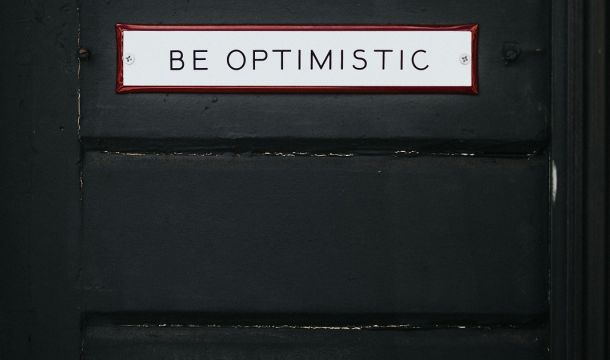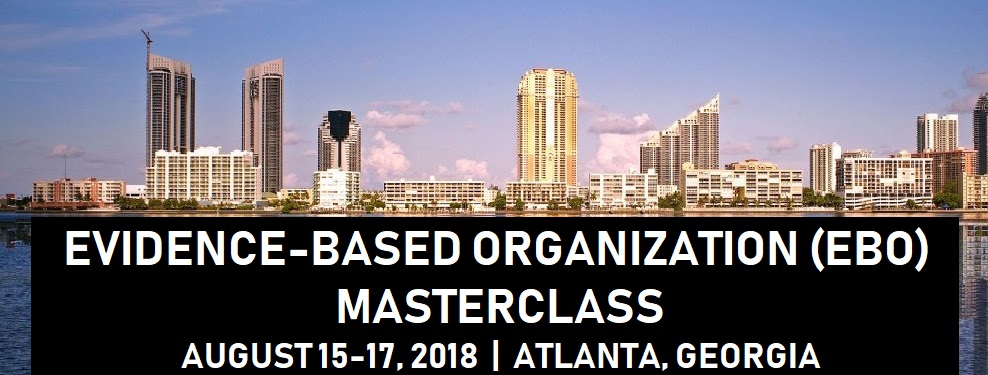EBO MASTERCLASS PROGRAM CONTENT & FACULTY
PROGRAM OUTLINE
Evidence-based policies, programs, and practices have become requirements of organizations striving for effectiveness and sustainability. Although the benefits from implementing evidence-based approaches vary widely based on organizational characteristics, overall, evidence-based organizations (EBO's) consistently demonstrate the ability to achieve desired outcomes through effective problem-solving and informed decision-making. In doing so, they use research evidence and data to drive decisions and to develop innovative approaches to delivering services. Their overall goal is to increase the likelihood that they and their clients will achieve desired outcomes.
Whether you are just starting out, or are further along, this Core and Advance Skills Masterclass will help guide you by providing simple, easy to follow research-supported frameworks others have applied to successfully become and remain evidence-based.
This Masterclass lays the foundation for both for achieving enduring client outcomes and for consistently reaching and exceeding the expectations of stakeholders and funding providers.
Agencies are encouraged to attend as teams, as this will help accelerate the adoption and transition toward becoming an EBO.
AGENDA-AT-A-GLANCE
DAY-1
8:30 AM - 5:00 PM
I. Making the case for evidence-based reform and the framework for becoming an evidence-based organization (EBO)
a. Increasing accountability
b. Declining resources, increasing cost
c. Steady or rising number of health, human and justice services recipients
d. Increasing offender populations; ongoing recidivism
e. Expanding technology
f. Expanding evidence-based knowledge
II. Knowledge and use of evidence-based “nuts and bolts”
a. Evidence-based policies, programs, and practices
b. Evidence-based principles
c. Evidence-based management
d. Evidence-based organizations
III. Demonstrating effective leadership
a. Qualities of effective leaders
b. Leadership versus management
c. Empowering staff
d. Leadership philosophy
IV. Understanding organizational culture and assessment
a. Organizational culture in practice
b. Characteristics of effective organizations
c. Staff of effective organizations
d. Organizational assessment: Why, how, and by whom?
DAY-2
8:30 AM - 5:00 PM
V. Engaging in strategic planning and performance measurement
a. Ineffective and effective strategic planning
b. Linking organizational vision and mission to agency activities and outcomes
c. Using data for problem analysis and needs assessment
d. Accountability for results through performance measurement
e. Ensuring program fidelity and continuous quality improvement
f. From performance measurement to program evaluation
* New Unit Added - Financial considerations for organizations or programs to thrive which managers and leaders tend to minimize!
VI. Enhancing organizational capacity and sustainability
a. Building internal and external support
b. Use results early, often, and in multiple ways
c. Ongoing role of leadership and management
d. Adapt and reassess over time
e. Marketing your success
f. Strategic funding and grant writing
DAY-3
8:30 AM - 3:00 PM
VII Advance Skills for Strategic Planning & Implementation
Having learned the framework for becoming evidence-based as an organization, (EBO), we will plan for implementation. You will be guided through the development of your agency-specific strategy and action plans for becoming an EBO, tools you will need, and resources for assessing where you are and what to do next.
Participants and their teams will collaborate as teams and be guided to produce strategic and action plans that will focus on the five major components of EBO development. They will use workshop time to develop their agency-specific strategic and action plans. Participants will also be in a position to address the common problems associated with moving from a training environment to the implementation, and evaluation of evidence-based organizational change efforts.
Participants will be given the opportunity to develop;
- A plan for infusing financial, budgetary and economic considerations relevant for sustaining programs
- An EBO vision and mission
- Organizational goals and objectives, centered on the 5 key aspects of EBO development
- Strategic and action plans for EBO development
- Action steps to be taken to carry out the strategic plan. These action steps will specify responsible individuals, time-frames, and resources needed
* It is desirable that 4 to 5 workshop participants attend from each agency, with at least one laptop computer available for group use.
FACULTY
Click on faculty name to view bio...
- Tom Clements, Serial Entrepreneur and Advisor, Author, "How to Run A Nonprofit: The 'Go To' Guide for All Nonprofit Managers"
- John Keene, Chief Probation Officer, County of San Mateo Probation Department
- David Myers, PhD., Professor & Director of Ph.D. Program, University of New Haven, Author "Becoming An Evidence-Based Organization: Demonstrating Leadership and Organizational Growth"
- Sobem Nwoko, President, Joyfields Institute, Founder, EBP Society
- Kim Scorza, Excutive Director, Seasons Center for Behavioral Health
PROGRAM OUTLINE
Evidence-based policies, programs, and practices have become requirements of organizations striving for effectiveness and sustainability. Although the benefits from implementing evidence-based approaches vary widely based on organizational characteristics, overall, evidence-based organizations (EBO's) consistently demonstrate the ability to achieve desired outcomes through effective problem-solving and informed decision-making. In doing so, they use research evidence and data to drive decisions and to develop innovative approaches to delivering services. Their overall goal is to increase the likelihood that they and their clients will achieve desired outcomes.
Whether you are just starting out, or are further along, this Core and Advance Skills Masterclass will help guide you by providing simple, easy to follow research-supported frameworks others have applied to successfully become and remain evidence-based.
This Masterclass lays the foundation for both for achieving enduring client outcomes and for consistently reaching and exceeding the expectations of stakeholders and funding providers.
Agencies are encouraged to attend as teams, as this will help accelerate the adoption and transition toward becoming an EBO.
AGENDA-AT-A-GLANCE
DAY-1
8:30 AM - 5:00 PM
I. Making the case for evidence-based reform and the framework for becoming an evidence-based organization (EBO)
a. Increasing accountability
b. Declining resources, increasing cost
c. Steady or rising number of health, human and justice services recipients
d. Increasing offender populations; ongoing recidivism
e. Expanding technology
f. Expanding evidence-based knowledge
II. Knowledge and use of evidence-based “nuts and bolts”
a. Evidence-based policies, programs, and practices
b. Evidence-based principles
c. Evidence-based management
d. Evidence-based organizations
III. Demonstrating effective leadership
a. Qualities of effective leaders
b. Leadership versus management
c. Empowering staff
d. Leadership philosophy
IV. Understanding organizational culture and assessment
a. Organizational culture in practice
b. Characteristics of effective organizations
c. Staff of effective organizations
d. Organizational assessment: Why, how, and by whom?
DAY-2
8:30 AM - 5:00 PM
V. Engaging in strategic planning and performance measurement
a. Ineffective and effective strategic planning
b. Linking organizational vision and mission to agency activities and outcomes
c. Using data for problem analysis and needs assessment
d. Accountability for results through performance measurement
e. Ensuring program fidelity and continuous quality improvement
f. From performance measurement to program evaluation
* New Unit Added - Financial considerations for organizations or programs to thrive which managers and leaders tend to minimize!
VI. Enhancing organizational capacity and sustainability
a. Building internal and external support
b. Use results early, often, and in multiple ways
c. Ongoing role of leadership and management
d. Adapt and reassess over time
e. Marketing your success
f. Strategic funding and grant writing
DAY-3
8:30 AM - 3:00 PM
VII Advance Skills for Strategic Planning & Implementation
Having learned the framework for becoming evidence-based as an organization, (EBO), we will plan for implementation. You will be guided through the development of your agency-specific strategy and action plans for becoming an EBO, tools you will need, and resources for assessing where you are and what to do next.
Participants and their teams will collaborate as teams and be guided to produce strategic and action plans that will focus on the five major components of EBO development. They will use workshop time to develop their agency-specific strategic and action plans. Participants will also be in a position to address the common problems associated with moving from a training environment to the implementation, and evaluation of evidence-based organizational change efforts.
Participants will be given the opportunity to develop;
- A plan for infusing financial, budgetary and economic considerations relevant for sustaining programs
- An EBO vision and mission
- Organizational goals and objectives, centered on the 5 key aspects of EBO development
- Strategic and action plans for EBO development
- Action steps to be taken to carry out the strategic plan. These action steps will specify responsible individuals, time-frames, and resources needed
* It is desirable that 4 to 5 workshop participants attend from each agency, with at least one laptop computer available for group use.
FACULTY
Click on faculty name to view bio...
- Tom Clements, Serial Entrepreneur and Advisor, Author, "How to Run A Nonprofit: The 'Go To' Guide for All Nonprofit Managers"
- John Keene, Chief Probation Officer, County of San Mateo Probation Department
- David Myers, PhD., Professor & Director of Ph.D. Program, University of New Haven, Author "Becoming An Evidence-Based Organization: Demonstrating Leadership and Organizational Growth"
- Sobem Nwoko, President, Joyfields Institute, Founder, EBP Society
- Kim Scorza, Excutive Director, Seasons Center for Behavioral Health
Recent Articles

Evidence-Based Professionals' Monthly - May 2024

Understanding the Criminal Pathways of Victimized Youth

The Price of Punishment: Exclusionary Discipline in Connecticut PreK-12 Schools

Breaking the Cycle of Absenteeism: Strategies for Prevention

Evidence-Based Professionals' Monthly - March 2024

Evidence-Based Professionals' Monthly - April 2024

Quarterly for Evidence-Based Professionals - Volume 8, Number 3

Unlock the Power of Cognitive Behavioral Therapy (CBT): Elevate Your Practice!


